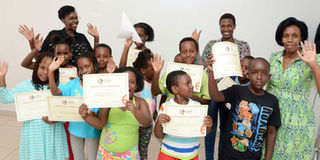Etiquette still matters today

Children show off their certificates after completing their etiquette training. Photo by GILLIAN NANTUME
What you need to know:
- MIND YOUR MANNERS. No more can we take it for granted that children will learn their manners because parents spend less time at home thus the need to deliberately teach etiquette, writes GILLIAN NANTUME
Children are lovely gifts, but if you had an unfortunate upbringing, sometimes, the older your children become, the more their behaviour and morals reflect of your earlier life. We have seen children whose manners were neglected in the grown men and women who chew with their mouths open, do not greet people, and are loudmouthed.
Gone are the days when mothers were fulltime housewives with the time to shape their children’s behaviour. Nowadays, children are left to teachers and housemaids, who frankly, will never be really concerned about your child’s behaviour. These gaps in child upbringing drove two women to start an etiquette centre to help career mothers in guiding their little ones.
“As mothers, sometimes, we do not have much time to sit with our children and talk to them about social etiquette,” says Dorah Kabonero, an etiquette consultant and founder, Uganda Etiquette Centre, adding, “First impressions matter, yet this is something that is no longer taught in schools.”
Believing she could offer a service, Kabonero applied to train at the International Etiquette and Protocol Academy of London. “I knew African cultural etiquette but I wanted to learn about British culture.”
She sold her idea to her business partner Gertrude Kitaburaza who was living in the USA. “It was a much needed service,” Kitaburaza says, continuing, “I remember one time I was at the Entebbe International Airport waiting in line, and the airline staff serving us was shouting at passengers. When Dorah told me of her plans, I enrolled at The Etiquette Institute in St Louis, Missouri.”
After their certification, they established the Uganda Etiquette Centre in 2015.
Are mothers neglecting their children?
In a few years time, what will be the role of a mother in the home? She has housemaids to perform the chores and now, she can ship her children off to etiquette class if she wishes. However, Kitaburaza says they are not trying to mother their students. “We do not do the mothers’ job but rather, compliment what they teach, picking up on the manners that have been left out.”
Rachel Nsiyona Kyobe, a Legal Manager Compliance with STANLIB, whose 11-year-old daughter attended etiquette training, is all praises about the changes she sees in her child. “Children watch a lot of TV and play video games in the holidays, and as a career mom I am not always there to guide them. Why wouldn’t I rather take my child to do some gainful learning?”
A few years ago, during holidays, it was the norm for children to go to the villages to learn all manner of chores and good behaviour. Nowadays, that practice is dying out because grandparents are city dwellers who retire late in life. “Finding activities to keep the children busy during the holidays is becoming hard,” Kyobe says, adding, “Put five children in a room and you will be surprised that they will spend an hour without talking to each other. All will be focusing on their smart phones.”
Many children prefer to be educated by teachers than by their mothers. When a mother instructs her child to perform some chore, chances are that the child will sulk; but not so when they are instructed by a motherly teacher they believe knows it all. This is the same view with teaching children social and dining etiquette. They are more open to learning from professionals.
When Alice Katasi enrolled her two children, aged 11 and 7, for etiquette classes, she was amazed at how they were eager to reenact what they had learned. “I did not enroll them because they were badly behaved. I just believed there was more they could learn. For example, most of us do not formally lay the dining table for dinner. As long as there are tablemats, plates and forks, we are good to go. My daughter now insists on a properly laid dining table, telling us we cannot put our arms on the table while eating and the proper conversation at diner. Clearly, there has been an impact.”
Etiquette for children and teenagers
When you educate a child in social and dining etiquette you open the way for subsequent generations because what a child learns, they will pass on to their own children.
The centre carries out two camps; one in December/January and another one in July which accommodate 30 children at a time. The camps last three days and cover both training and outdoor activities. When they graduate, the children are given certificates.
“Dining is more than holding a fork,” says Kabonero, continuing, “For instance, it is improper to pick your teeth while people are still eating. The buffet is the commonest form of dinning and I tell young people not to heap their plates because soup may pour on other people’s clothes and they may not even finish the food.”
The subject of bullying is also addressed. In Western culture, bullying has caused some teenagers to commit suicide. Although in Uganda it has not reached such desperate levels, bullying is still a social problem. “We teach children to accept and interact with those who are different from them, in terms of religion, skin colour, tribe and disabilities. They should look for the things they have in common and highlight them.”
Kitaburaza focuses on social media etiquette, a raw area where people hid behind pseudonyms to troll and insult other users. “I am passionate about social media and try to show children that as much as it is good, it can also be dangerous. They should not post things they will regret in the future or things their mothers would not like, or abusive messages. More importantly, they should not put out too much information.”
With the rise in entertainment channels and reality TV, impressionable teenagers are struggling to keep up with fashion trends. “Our emphasis is that teenagers should not dress in a certain way because everyone is dressing like that,” Kitaburaza advises, adding, “We teach them to know their bodies and dress accordingly in what they think is elegant and decent.”
Children are also taught personal hygiene and the magic words, such as, ‘please,’ ‘sorry,’ and ‘excuse me,’ and how to talk with other people. “My daughter has learned that when greeting, she has to offer a full handshake and look the person directly in the eye,” Kyobe says, continuing, “This has helped her fight shyness and given her confidence.”
Her daughter now also takes the time to greet the guard, teachers, and cook at her school.
Teaching adults
Both Kabonero and Kitaburaza are certified to teach corporate, business, and social etiquette. Next year, they hope to start a programme for adults. “When Dorah and I went for training, we were wondering exactly what we were going to learn that we did not know,” Kitaburaza says, continuing, “But, you will not believe just how much there is to learn. Yes, you already know some things but we can add to what you already know.”
Kabonero adds, “In business etiquette, we will talk about the art of creating a first impression, which is usually the lasting impression one has of you. We will also address appropriate dress for different occasions. Some people go to office dressed as though they are going to a cocktail party. When it comes to business luncheons, many hosts do not know that they should lead their guests to their places at the table. If you are invited to a luncheon, do not rush to get the best place; always wait for your host to show you where to sit.”
In an ever changing world where an interview with a prospective employer could include a luncheon, one definitely needs pointers in dining etiquette. “Good social manners are a part of your CV,” Kyobe advises, adding, “It is important to learn etiquette as a child because even if you have many qualifications, people will not sit with you if they cannot tolerate your attitude and behaviour.”
As much as it is good, professional etiquette training, should not make parents neglect to talk to their children and keep in touch with the challenges they face. Sometimes, it is as simple as teaching them the basic principle: think about other people’s feelings first before you do or say something. Life is not all about you.
Highlights in etiquette
•Chew with your mouth closed and do not talk with food in your mouth.
•While eating, keep your elbows off of the table.
•Wash your hands after going to the toilet.
•If you bump into someone, have the courtesy to say. “Excuse me.”
•Do not let your children act wild in public places, such as restaurants.
•Do not touch someone’s stomach when she is pregnant or even when she is not.
•Do not leave the doors of drawers open, someone might get hurt.
Why is etiquette important?
•Knowing how to behave appropriately makes life more comfortable.
•Proper etiquette requires that you make others comfortable and protect their feelings.
•Etiquette enhances communication by breaking barriers.
•At work, you are perceived as more capable, more professional, and more intelligent.
•It makes good first impressions. The first five to seven seconds after you meet someone are crucial because they leave a lasting impression.
Feedback: What are some of the habits people do that tick you off?
Buluma Robert. Those who take others as their ATM. They beg all the time for money and usually budget in other people’s pockets. Begging is really a bad etiquette and I wonder why society tolerates it.
Kitts Emmanuel Emmar Going into public toilets of well established companies with employees whom you take to have integrity, but u find the whole toilet walls smeared with faeces with the help of fingers yet toilet papers are cheap nowdayz
Mary Gold Riela Guys who throw good for nothing words at you while ur moving and once you don’t give them attention,they abuse u with very heavy words. They leave me wondering.
Anna Kukundakwe Eating while talking with food in the mouth. Using hands instead of toothpicks ,men that weigh their private parts and start removing the bu pintos in public or God I can write a book on bad etiquette
Kawooya Alex Borntowin over leaking a spoon and afterwards use it to stir other people’s porridge
Atim Florica Picking their nose with bare fingers, then spitting on the wall inside the house.
Wante Davis Samuel Guys that spit through the windows while traveling using a bus ,especially buses from western Ug.
Nakabuye Hasifah Someone who concentrates on phone while having a meal or having a person to person conversation
Kagimu Yusuf Arrogance from characters of a certain ethnicity in Uganda, they ask , “do u know who am I”
Kinyama Julius ladies who sit badly with intentions of tempting those who look at them.
Josephine Pretty Joe Unnecessary spitting everywhere, smoking while on both bus and train plus nose-picking by chinese.
Usama Kafeero people who spit in the sink for washing hands in a restaurant just makes me absolutely sick
O’George Kurts L’Apio Speaking with food in the mouth, sneezing in the air when in company of other (s).
Prisca Tweteise Men grabbing or squeezing their ‘things’ in public. Arrrhg!!
Owiny Olive Gassing in public instead of excusing his or herself
Onen Denis Lamong Dirty children’s neighbours playing on you.
Magaya Timothy Trevor Ooohhh my God!!!!!!!
NOSE PICKING........ I hate it
Kiwanuka Mahad That one mainly in a taxi
Wasswa Richard Somebody leaning on me when I’m using public transport or in church.
Semanda Sam Someone belching....... Arraaagghhhhh
Grace Nyangoma Chewing gum while talking,
Ahaisibwe Jovita People who chew gum in public




